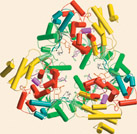Research
Citations
He
smells, she smells
Women
apparently prefer the odor of men who are genetically similar
to themselves, according to research reported by postdoctoral
fellow Suma
Jacob, AB'91, PhD'98, MD'01; Martha
K. McClintock, the David Lee Shillinglaw distinguished
service professor in psychology; and human-genetics professor
Carole
Ober in the February Nature Genetics.
The study, which had women sniff T-shirts that men had worn for
two days, found that a woman's preference is based on the man's
genetic match to her paternal genes. The researchers believe the
gene-matching system's evolutionary purpose is to avert the risks
of both inbreeding and outbreeding: while mating with a close
relative increases the risk of a child with bad versions of the
same genes, mating with someone too different, says McClintock,
"leads to the loss of desirable gene combinations."
The
feeling lasts and lasts
Researchers
have long known that nicotine stimulates pleasure by causing the
brain's "reward center" to release dopamine. But now
Daniel
S. McGehee, assistant professor of anesthesiology
& critical care, has shown it also neutralizes the dopamine
"off-switch," so the feel-good chemical just keeps on
coming, according to a study in the March 14 Neuron. No
wonder, he says, the stuff is so addictive.
When
diversity's a bad thing
Investors
beware: conglomerates-highly diversified corporations-are less
than the sum of their parts when it comes to the value of their
assets. Thus, proposed mergers should be viewed with skepticism.
This is according to associate professor of finance Owen Lamont
in the January Journal of Financial Economics. Lamont
compared the asset values of firms that merge with those that
spin apart to show that "diversification destroys value."

Dissecting
anthrax
Chicago researchers have worked out the three-dimensional
structure of the edema factor, part of the deadly toxin produced
by the anthrax bacteria. The edema factor, so called because it
causes swelling, changes shape when it bumps into a common cell
protein called calmodulin, report Wei-Jen
Tang, associate professor in neurobiology, pharmacology,
and physiology, and doctoral student Chester
L. Drum, AM'94, in the January 24 Nature. The
change causes the toxin to generate a chemical messenger that
blocks the body's cells from alerting the immune system of a bacterial
invasion.
Take
it out of your next raise
Procrastination
is a major reason Americans don't save for retirement ("Investigations,"
December/01). So why not get employees to agree in advance to
devote future pay increases to savings? That's the thinking behind
"Save More Tomorrow," a plan presented by Richard
Thaler, the Robert P. Gwinn professor of behavioral
science and economics, at the January meeting of the American
Economics Association. In a test program at a Midwestern firm,
Thaler says savings rates for participating employees jumped from
less than 4 percent to nearly 12 percent in 28 months. He is working
with the Vanguard Group, which administers 401(k) programs, to
run a pilot program at Philips Electronics.
Other
dimensions in sight?
At
the February convention of the American Association for the Advancement
of Science, Maria
Spiropulu, an Enrico Fermi Fellow, said she expects
to discover so-called space warps-hidden dimensions besides space
and time-by 2005. Spiropulu recently led the analysis of data
from experiments at Fermilab's high-energy particle accelerator.
In those collisions, the conservation of energy and momentum can
be measured, so what's left over after a crash-and most importantly,
what's not there-may be the telltale clue. "A significant
imbalance would indicate the graviton [the particle that carries
gravity] has trickled into an extra dimension, a place where gravity
may become very strong and other weird properties may kick in,"
Spiropulu says. There's no hard evidence of the dimension yet,
but she believes it's just around the corner.
-
S.A.S.

![]()
